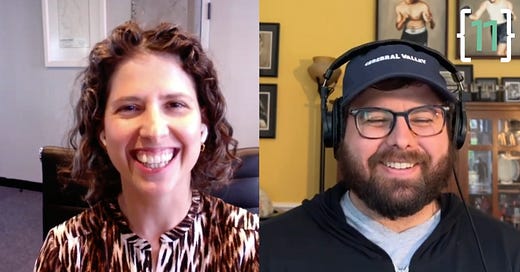It’s been a sad state of affairs for consumer companies not named TikTok.
Poparazzi just shut down. (At least some of the team went to Instagram.) Popshop is struggling. The venture capital firm Benchmark helped establish both companies as consumer startups to watch by leading their Series A rounds.
Sarah Tavel, who led the investment in Poparazzi and has worked closely with Popshop, agreed to come on the Newcomer podcast to talk about the brutal state of consumer startups. “Our deep belief at Benchmark is that our job is not to predict the future, but to try as best we can to see the present clearly,” Tavel told me.
Of course, it’s not just Benchmark’s once high-flying startups that are reeling. Andreessen Horowitz audio company Clubhouse laid off more than half of its employees. Hype for the photo company BeReal seems to be dying down. (Searches for the company’s name on Google are at less than half their peak.)
“It is a really tough environment right now to build that type of company,” Tavel said about startups building for consumers. “It’s always been difficult, but the level of difficulty has been turned all the way on. Because right now, anybody building something in consumer has to compete with the most addictive consumer format that we’ve ever had — which is short video.”
Tavel, who co-led an early investment in Pinterest and then became the company’s first product manager, talked through some of the most promising opportunities in startups. Artificial intelligence seems poised to create new consumer startups. Tavel flagged the legal artificial intelligence company EvenUp, which just raised at a $350 million valuation from Bessemer, as one such promising startup. I marveled at the bootstrapped rise of Midjourney.
But, of course, many generative AI startups, especially ones building foundation models, are raising such large rounds that it can be difficult for a firm like Benchmark to rationalize an investment.
We also talked about one of Tavel’s most successful investments at Benchmark, Chainalysis. The blockchain data company raised $170 million at $8.6 billion last year. The New York Times wrote a glowing profile of the company last month.
Tavel, who doesn’t like to announce her startup investments, revealed that she has secretly invested in an unannounced NFT company.
“Crypto is a bad word now,” Tavel told me. “It’s really hard to train consumers to trust something again — once a consumer has made a first impression. It’s much easier to teach a user a first impression than to rewrite that first impression.”
Finally, I asked Tavel to give us a peek behind the curtain at Benchmark. Fortune’s Jessica Mathews recently interviewed Benchmark’s Bill Gurley about his decision to step back.
“The venture business, if you want to be at the top, requires insane, remarkable hustle… You have to live in fear that the next Google is going to get funded by a firm that’s not yours,” he says. “Either you’re in there rowing as hard as you can, because we’re all a team, or you’re not.”
That said, he still has strong instincts about the future of tech. “If I were still active as a venture capitalist, I’d be looking at a lot of the vertical applications of A.I. I look at the coding stuff, and it’s insane… If you’re not using it, I think you’re probably writing your own death certificate as a programmer, because people are going to be so much more efficient. And the question is: What are other applications that have that kind of productivity boost or lift, and I think people are trying to figure that out.”
But in the end, it was a book by Steve Martin, Born Standing Up, that helped convince Gurley it was time to step back. “One day, [Martin] is in Vegas and he comes out, and the top row is empty, the first time he’s ever seen the top row empty. He quits the next day—never does standup again. And then he goes off and he does his banjo and his theater and his acting.… Like I said, I don’t think I ever played the stage, so I’d rather not say I’m the same. It influenced me. That notion influenced me.”
Today, the Benchmark partnership is made up of Tavel, Peter Fenton, Eric Vishria, Chetan Puttagunta, and Miles Grimshaw.
Tavel said about the firm, “We’ve always had a pretty simple idea, which is that there’s this creative destruction.”
“Once you start — there’s no training wheels. So you’re thrown into the deep end. You’re an equal partner and you’re expected to be 100% until the minute that you retire,” Tavel said. “And when you have an equal partnership, it kind of pushes you in the direction of just recognizing — as Bill said in that interview — the hustle may not be in you anymore. And if you feel that way, then the model — as was set up by the founders — is such that it’s time to raise your hand and move on.”
Of course, my understanding is that partners like Gurley, Matt Cohler, and Mitch Lasky remain fairly heavily involved at Benchmark even so.
“It’s like an affliction. The reason they’re here in the first place was because the curiosity and competitiveness and the drive for learning and relevance, being in the mix, that never leaves you,” Tavel said. “They are a significant portion of our LP base, they’re still there on Mondays, and I’m texting all of them all the time.”















Share this post